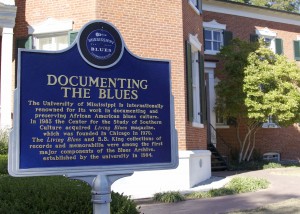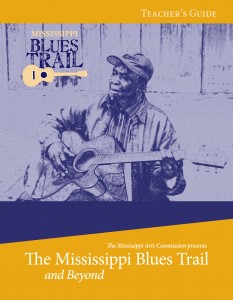 Mississippi teachers and educators took a multifaceted look at the new Mississippi Blues Trail Curriculum in a workshop hosted by the J.D. Williams Library Blues Archive Sept. 21.
Mississippi teachers and educators took a multifaceted look at the new Mississippi Blues Trail Curriculum in a workshop hosted by the J.D. Williams Library Blues Archive Sept. 21.
According to the Mississippi Blues Trail website, the curriculum was created to bring the blues tradition into fourth-grade history classrooms and acquaint students with the experiences of the men and women behind the music.
Greg Johnson, blues curator and associate professor at Ole Miss, helped set up the event in coordination with the Mississippi Arts Commission.
“The workshop showed teachers how to incorporate the blues curriculum into the classroom through an arts-integrated approach,” said Johnson.
Participants examined blues culture through musical, sociological, anthropological, historical and literary lenses.
“It made the blues come alive,” said Rebecca Jernigan, local actor and playwright who seeks to educate children through her performances around the state. “It was a great way to recognize and understand the blues heritage in Mississippi.”
The Blues Trail curriculum was generated from the more than 172 trail markers around the state, which tell the unique story of Mississippi blues culture.
Trail-marker locations range from city streets to cotton fields, train depots to cemeteries, and clubs to churches, according to the Blues Trail website.
Scott Barretta, primary writer and researcher for the Mississippi Blues Trail markers and co-author of the blues curriculum, was pleased he could present content directly to teachers.
“One of our main goals in creating the curriculum was to draw on this unique resource to help educate Mississippi students about the wonderful musical heritage of their state,” Barretta said.
The workshop helped teachers acknowledge important cultural questions, said Johnson. “What conditions existed for blues to develop into a musical genre/style? What subjects are addressed in blues lyrics? What impact has blues had on popular culture?” 
“It was well developed and researched and understandable for the layperson who isn’t necessarily the musical expert,” Jernigan said.
Mark Malone, co-author of the Blues Trail curriculum and professor of music at William Carey University, also spoke at the event.
“We want to teach children about Mississippi,” Malone said. “Lesson plans for teachers plug into arts, music, theatre, social studies, history and geography.”
To demonstrate a practical use of art integration, Malone introduced participants to boomwhackers, which are tubes cut to different sizes that can make a 12-bar blues progression.
Blues musician Terry “Big T” Williams treated workshop attendees to a musical performance during lunch, which gave the attendees an opportunity to experience the blues firsthand. He also answered questions from the audience after his performance.
Greg Johnson also performed on his one-string, cigar-box banjo to accompany Rebecca Jernigan’s spoken-word performance of “The Legend of Robert Johnson.”
“Many have argued that [the] blues is our state’s greatest cultural export,” said Johnson. “It should be studied.”
To learn more about the Mississippi Blues Trail Curriculum, click here.